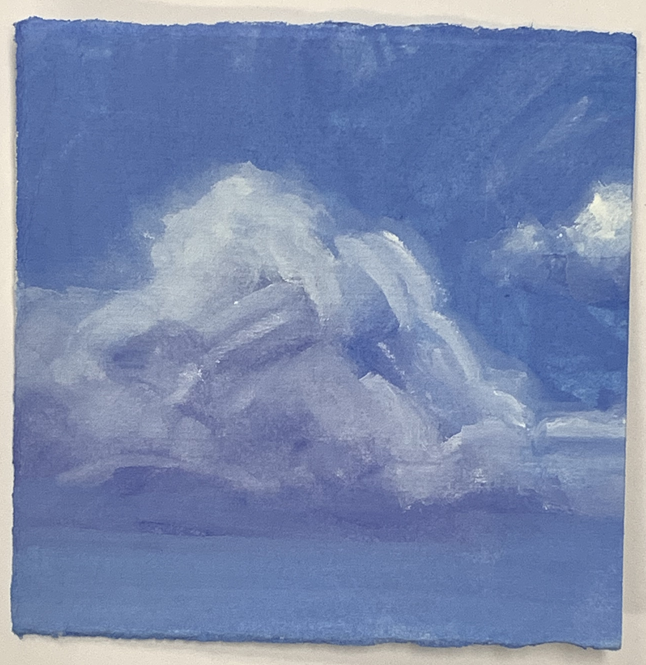 Jean Wilkey
Jean Wilkey
One Stitch at a Time
by SAMA KHALILY
Two years ago, while I was visiting a friend in another city, I got a text message from my mother asking me if I had seen the news on Instagram. I stopped studying for the final exam I had to write that day to take a look and learned that my aunt had been arrested. I immediately called my dad who told me my Aunt Shiva had been arrested that morning. He told me I should not worry about anything, just continue studying. I wrote my exam that night, but was unable to finish it and got a terrible grade. After the exam, I bought a bus ticket and returned home the following day. When I arrived, I found out that my aunt’s crime was what the Islamic Republic of Iran refers to as “Propaganda against the System.”
Later on, my family learned that this charge had been leveled against my Aunt Shiva because she had created a group on WhatsApp to gather donations to support homeless and working children in our city. She had crocheted dish scrubs and loofas and sold them online to supplement the WhatsApp donations. With these funds, she had purchased clothes, school supplies, toys, interactive games, and snacks for the children. Aunt Shiva had also set up a WhatsApp channel dedicated to the sharing of recycling tips. We all knew that any kind of activism was illegal in Iran, but we thought that to brand efforts as well intentioned as well intentioned the ones she was making as “Propaganda Against the System” was simply ridiculous.
Shortly after her arrest, my aunt was sentenced to one year in prison. It took the authorities two years to issue her summons. But when the time came for her to say goodbye to us, she did not cry or even look sad, though there was a hint of fear in her voice. A few days after she had begun her prison sentence, my aunt called my uncle to ask him to send her some money for crocheting supplies; she told him she was teaching her fellow prisoners how to crochet and was hoping to help them sell their work in the bazaars. With that phone call, the atmosphere of sadness that had been enveloping the family since my Aunt Shiva had left us, completely dissipated. We knew that, even in the depths of adversity, she had found a glimmer of joy.
It turned out that there was a store selling yarn in the prison! And as soon as she learned this, my Aunt Shiva had asked her fellow inmates if they wanted to learn how to crochet, even though she herself only knew how to make circular dish scrubs! My aunt provided the yarn and hooks for those who could not afford them and explained to them her vision for selling what they made. Once again, she surprised us all with her resilience and kindness. As she went about her work for this project, she formed bonds of friendship with her fellow prisoners and also with the guards. We soon realized that we need not worry about my Aunt Shiva. Wherever she was, she had faith on her side. And, sure enough, when we visited her in prison, she explained how crocheting had become a form of therapy for her and for her fellow prisoners. “In this difficult, chaotic environment,” she told us, “it truly helps to stay focused and grounded.” She added: “When we are crocheting, we do not have time to overthink and assume worst-case scenarios; we are simply stitching our time away and creating a calm and peaceful environment.”
When we asked Aunt Shiva how she had managed not only to befriend her fellow prisoners, but to convince them to take on crocheting, she told us that when she finally arrived at the prison to begin her sentence, she was not scared anymore, especially when she saw that she was having an opportunity to meet people she might never have a chance to meet if she were not in this situation. The plan to start her fellow prisoners crocheting came to her when she realized how much feelings of boredom and the lack of opportunities for productive work were amplifying the worries of her fellow prisoners. As she put it, “Teaching my fellow cellmates to crochet not only brought us together, but also helped us open up about our experiences in a way I would never have thought possible.” She told us how exciting it was to see the joy and the pride on the faces of her fellow prisoners when they had finished even a small piece of crocheting. Two weeks after her project began, the prison store ran out of crocheting supplies and had to order more. This had never happened before, since most of the prisoners had not shown any real interest in crafts until Aunt Shiva arrived.
As I thought about my Aunt Shiva’s prison story, I realized that my aunt was no longer the aunt I had known — the one who was afraid of needles, the dark, chickens, and . . . . Aunt Shiva had become a new version of herself, someone I had never met before! She had transformed the difficulties she faced into opportunities. To witness her unwavering determination to teach her fellow prisoners a craft that would not merely occupy their time but also bring them joy, was truly inspiring. Like so many Bahá’ís who face persecution in Iran, my Aunt Shiva, had shown, in the most unexpected place and in the most unexpected way, remarkable strength and resilience.

